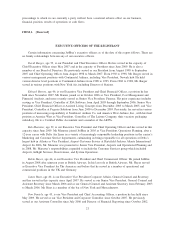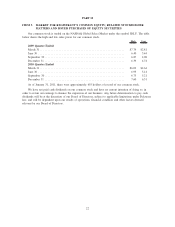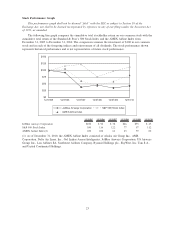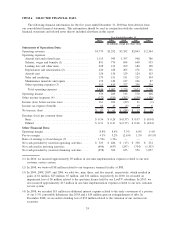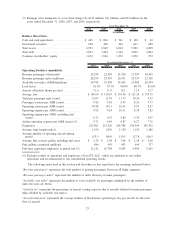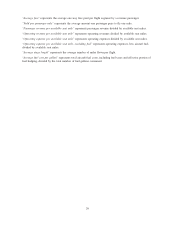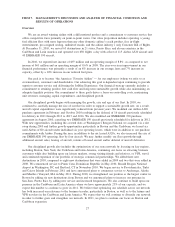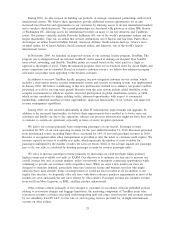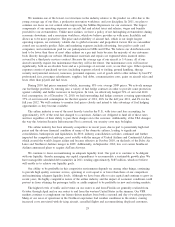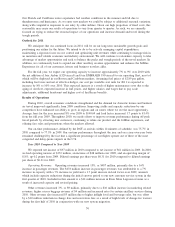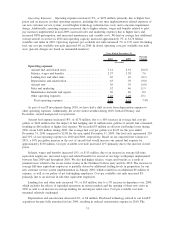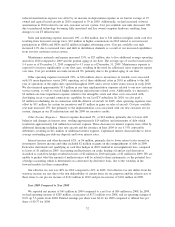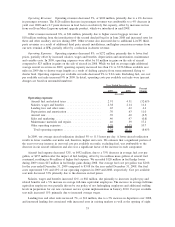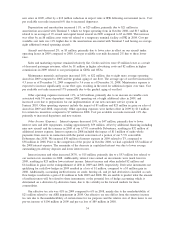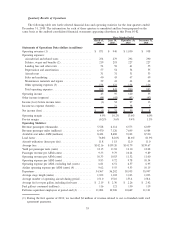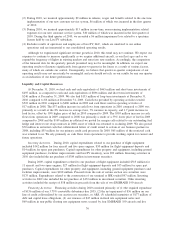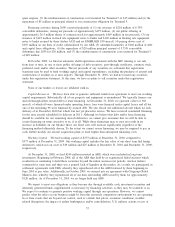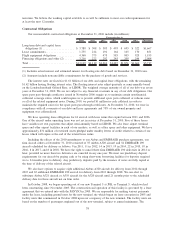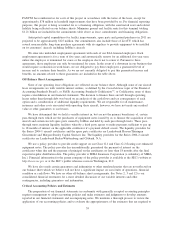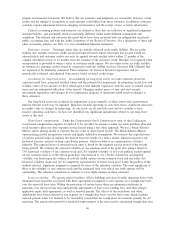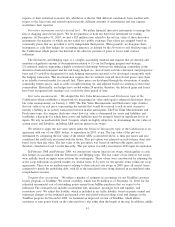JetBlue Airlines 2010 Annual Report Download - page 40
Download and view the complete annual report
Please find page 40 of the 2010 JetBlue Airlines annual report below. You can navigate through the pages in the report by either clicking on the pages listed below, or by using the keyword search tool below to find specific information within the annual report.
Operating Expenses. Operating expenses increased 15%, or $439 million, primarily due to higher fuel
prices and an increase in other operating expenses, including the one time implementation related expenses of
our new customer service system, overall higher technology infrastructure costs, and a one-time impairment
charge. Additionally, operating expenses increased due to higher salaries, wages and benefits related to pilot
pay increases implemented in mid 2009, increased sales and marketing expenses due to higher fares and
increased GDS participation, and increased maintenance and variable costs. We had on average five additional
average aircraft in service in 2010 and operating capacity increased approximately 7% to 34.74 billion
available seat miles in 2010. Operating expenses per available seat mile increased 7% to 9.92 cents. Excluding
fuel, our cost per available seat mile increased 6% in 2010. In detail, operating costs per available seat mile
were (percent changes are based on unrounded numbers):
2010 2009
Percent
Change
Year Ended December 31,
(in cents)
Operating expenses:
Aircraft fuel and related taxes ...................... 3.21 2.91 10.6%
Salaries, wages and benefits ....................... 2.57 2.38 7.6
Landing fees and other rents ....................... .65 .65 (0.1)
Depreciation and amortization ...................... .63 .70 (9.8)
Aircraft rent ................................... .36 .39 (6.0)
Sales and marketing ............................. .52 .46 11.5
Maintenance materials and repairs ................... .50 .46 8.2
Other operating expenses.......................... 1.48 1.29 15.1
Total operating expenses ........................ 9.92 9.24 7.4%
As part of our IT investments during 2010, we have had a shift in costs from depreciation expense to
other operating expenses. Additionally, the severe winter weather during 2010, both in February and
December, created unexpected cost pressures.
Aircraft fuel expense increased 18%, or $170 million, due to a 10% increase in average fuel cost per
gallon, or $104 million after the impact of fuel hedging and 31 million more gallons of aircraft fuel consumed,
resulting in $66 million of higher fuel expense. We recorded $3 million in effective fuel hedge losses during
2010 versus $120 million during 2009. Our average fuel cost per gallon was $2.29 for the year ended
December 31, 2010 compared to $2.08 for the year ended December 31, 2009. Our fuel costs represented 32%
and 31% of our operating expenses in 2010 and 2009, respectively. Based on our expected fuel volume for
2011, a 10% per gallon increase in the cost of aircraft fuel would increase our annual fuel expense by
approximately $130 million. Cost per available seat mile increased 11% primarily due to the increase in fuel
prices.
Salaries, wages and benefits increased 15%, or $115 million, due to an increase in average full-time
equivalent employees, increased wages and related benefits for several of our large workgroups implemented
between June 2009 and throughout 2010. We also had higher salaries, wages and benefits as a result of
premium time related to the severe winter storms in the Northeast both in early and late 2010. The increase in
average full-time equivalent employees is partially driven by additional staffing levels in preparation for our
new customer service system implementation in January 2010, which resulted in an additional $9 million of
expense, as well as our policy of not furloughing employees. Cost per available seat mile increased 8%
primarily due to an increase in full-time equivalent employees.
Landing fees and other rents increased 7%, or $15 million, due to a 5% increase in departures over 2009,
which includes the effects of expanded operations in certain markets and the opening of three new cities in
2010 as well as an increase in average landing fee and airport rental rates. Cost per available seat mile
remained relatively unchanged.
Depreciation and amortization decreased 4%, or $8 million. Purchased technology related to our LiveTV
acquisition became fully amortized in late 2009, resulting in reduced amortization expense in 2010. The
31


